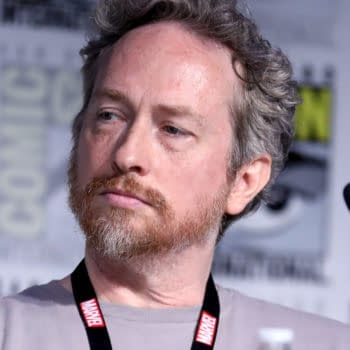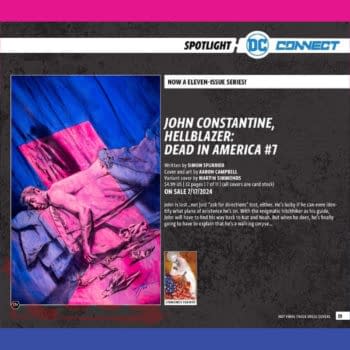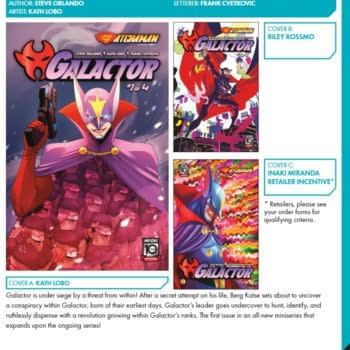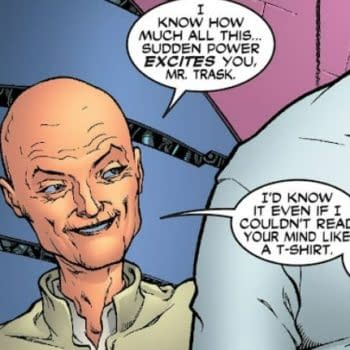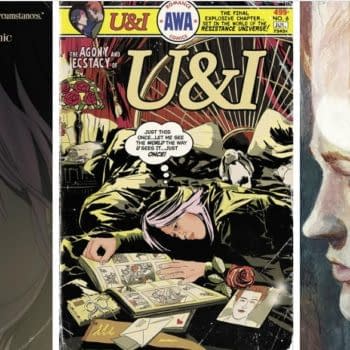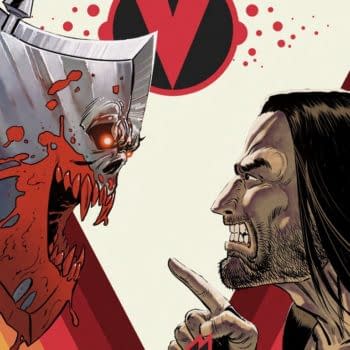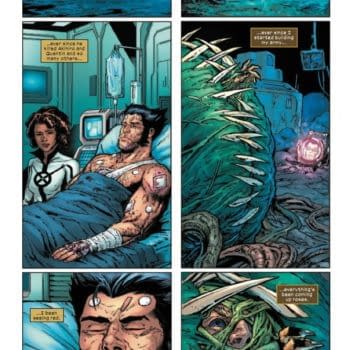Posted in: Comics | Tagged: comic con, Comics, jamie colville, new york, NYCC
Eleven NYCC Panels In Full Glorious Audio From Jamie Colville
Thank heaven for Jamie Colville. One man and his dictaphone who goes around conventions, picking and choosing panels, and then recording them, as well as taking some great photos.
And here's what he came home with.
[audio:http://www.TheComicbooks.com/Audio/2013-10-09-NYCC-ICV2-GraphicNovelsInADigitalWorld.mp3]
Graphic Novels – Growing in a Digital World. (1:01:51, 56.6mb)
This was moderated by Calvin Reid (Publisher's Weekly). On the panel was Trudy Knudsen (Manger eContent Acquisitions, Follett), Dallas Middaugh (Director, Publisher Services) Barry Nalebuff (author, Mission in a Bottle), Rich Johnson (Founder, Brick Road Media), Greg Goldstein (President & COO, IDW) and Leyla Aker (Vice President Publishing, Viz). The group talked about digital comics in libraries. Trudy said they are very popular and they need more of them. It was said that comics are great for reluctant readers and manga is the most popular form of comics in libraries. The publishers on the panel discussed getting comics into libraries. Leyla mentioned when going digital Viz decided to build their own App instead of selling through the usual channels, because none of them could do right to left reading method digitally and also so they would get the data on their customers reading habits. IDW said they've been making books like the Artists Edition line to give people a reason to buy print as you can't replicate full sized art digitally. Leyla said Viz had worked to get day and date translations released at the same time as the Japanese publishers as a way of combating free scanlations that were coming out on the web before their version was released. Barry said Scott McCloud's book (Understanding Comics) was very useful when they hired and illustrator for his book. He also talked about the difficulties with getting media coverage because it's a business book told via comics format. Both the business and graphic novel media see it as belonging to the other and not covering it. The group had discussed the diversity of comics out there. They said comics for kids has seen a great deal of growth recently, particularly My Little Pony. Scholastic had ordered more My Little Pony books than anything they've ordered previously. The group had answered questions on how they sell a new type of product they haven't sold before and how they come up with a price point. They talked about getting journalists to cover their work. At the end they spoke about Manga by non-Japanese creators too.
[audio:http://www.TheComicbooks.com/Audio/2013-10-09-NYCC-ICV2-RiseOfGeekCulture.mp3]
The Rise of Geek Culture. (1:06:31, 60.9mb)
On the panel was Ed Catto (co-founder Bonfire Agency), Shawn Kirkham (Director, Business Development Skybound), Gerry Gladstone (Co-Owner Midtown Comics), Steve Rotterdam
(co-founder Bonfire Agency), Rob Salkowitz (Author, Comic Con and the Business of Pop Culture) and the moderator was Milton Greipp (ICV2). The panel started off with Ed Catto giving a presentation of some numbers of how many people are involved in Geek Culture and how much money is spent. He explained the effect of Geeks opinion and how geeks become taste makers for others to follow, then how that influences the media. New Apple and Samsung commercials that incorporates geek culture within their ads were shown to demonstrate how geek culture has entered into the mainstream. They spoke about marketing to the different type of fans and went through some good and bad examples of companies trying to market to geeks (the touched on this topic a couple more times throughout the panel). Another topic that came up is if we have reached "peak geek" or not. Gary was concerned about too many bad superhero movies could hurt the comics industry and said we were not too big to fail. Shawn had talked about the success and new/odd cross promotions of the Walking Dead (including a new debt card). The group discussed efforts in getting movie/tv watchers to buy the comics. Towards the end the group had spoke about the growth in geek girls and cosplay in particular.
[audio:http://www.TheComicbooks.com/Audio/2013-10-10-NYCC-ProtectItPublishIt.mp3]
Protect It and Publish It! Creating and Protecting Your Comic Book Property. (1:56:04, 106mb)
This is a 2 part panel that I've merged into a single file. Moderated by Thomas Crowell Esq. (Entertainment Attorney) with him were 2 other entertainment attorneys, Matthew Tynan and Sheafe Walker Esq. Also with them was 3 creators, Allan Norico, David Gallaher and Alan Robert. The legal team gave a disclaimer that what they say during the panel is not legal advice. They first talked about copyright, what those rights are, when you get those rights, what the benefits are to registering the copyright and how you can do that. They presented information about contracts, the Chain of Title, why you would want a contract between collaborators, the legal distinction of who the author of the work is and how that is determined legally, the potential pitfalls of joint authorship, exclusive and non-exclusive rights, how ideas in themselves can't be copyrighted and what work for hire is. They also talked about the benefits of setting up an LLC, hiring an artist and work for hire agreements. Major comic book cases were touched on briefly and they gave an intellectual properties rules of thumb. The 2nd part of the panel was more about the creative end. They went into issues of promoting what you created in terms of pitching it to publishers and gave a run down of do's and don'ts during a pitch. They mentioned networking with publishers (and their editors) at conventions and tips about establishing a relationship with them at the con. They spoke about negotiating a publishing deal, online submissions, tips on working with the publisher after the deal has been made. They went into royalties and talked about how the current royalty pool works in terms of what creative role (writer, artist, inker, etc..) gets what percentage of the royalties. They quickly addressed DIY (Do It Yourself) publishing in terms of printing, distributing and digital publishing. Then they gave a contracts rule of thumb. After both sessions they took questions from the audience. Much of the audience were creative people. Those involved at the panel worked together on a booked titled
The Pocket Lawyer for Comic Book Creators, which will be out March of 2014.
[audio:http://www.TheComicbooks.com/Audio/2013-10-11-NYCC-ComicsHollywood.mp3]
Comics, Hollywood and What Creators Need to Know. (1:24:47, 77.6mb)
This panel was moderated by Buddy Scalera. On the panel was Mike Richardson (Dark Horse), freelance writer/inker Jimmy Palmiotti and Ross Richie (Boom!) Jimmy talked about his experience licensing Ash and Painkiller Jane. Mike talked about Dark Horse licensing comics and how his licensed work became Movies (Predator 2 is an example) and his own work being licensed into movies. He told many stories from licensing the Mask, Time Cop and other movies. Ross explained his history of working for Malibu Comics and going away to work for Hollywood. He ran away screaming from Hollywood and started up his own comic book publishing. Because Hollywood reads comics, they recognized his name and came after him for Boom! books. Jimmy explained what breaking down a series means for a TV show. Ross helped manage a talk about what certain terms mean in Hollywood and the various roles that Agents, Producers, Managers and Entertainment Lawyers play and where/why you would need one. Somebody asked about people stealing their ideas and Jimmy and Mike says it actually happens all the time. They wouldn't name names but Jimmy talked about ideas that he had pitched to particular directors suddenly done without his involvement. He said he had a really hard lesson in a company admitting they stole the idea but to successfully litigate it would cost him 2 million dollars. Since he couldn't afford that he had to walk away. Mike talked about getting sued for movies like the Mask and Time Cop. The talked about shopping the property around. Mike and Ross talked about first look deals what they are and the pro's and con's of the deal. Ross Richie had to leave part way through. Jimmy spoke about why he's doing a lot more written work as of late and wanting to raise his profile. Mike talked about giving Carla Speed McNeil more spotlight. Mike said thanks to the internet if you have talent it is much easier to get noticed as people are looking for talented artists. Jimmy and Mike said you can't do a comic that is a movie pitch as you recognize right away and it's makes a bad comic. Mike said publishers that try the comic to movie business model usually fail because it takes a long time for the movie to get made, if it gets made at all. Mike said comic creators want to keep the certain comic book related rights and you want an entertainment lawyer and they should get involved in with rest of the movie as much as possible. Mike said Dark Horse got the rights to do Prometheus comics and he's very happy about it. Mike gave advise on how to pitch to him and recommended the Mystery Box Ted Talk. At the end Buddy
spoke against downloading comics.
[audio:http://www.TheComicbooks.com/Audio/2013-10-11-NYCC-EditorsOnEditing.mp3]
Editors on Editing. (1:11:43, 65.6mb)
This panel was more about how to break into comics via pitching to editors. On the panel was Warren Simons (Valiant), Scott Allie (Dark Horse) and Chris Ryall (IDW). Moderating the panel was Buddy Scalera. They first talked about their recent books. They then went through the do's and don'ts of pitching as a writer or artist. They talked about pitching at a con, establishing relationships, using the online submission process. The audience asked some questions and they answered questions on how to become an editor and how to become an intern. They spoke briefly about licensing issues and what happens when a deadline gets missed. At the end they plugged other upcoming books and Buddy asked fans not to download/torrent comic books.
[audio:http://www.TheComicbooks.com/Audio/2013-10-11-NYCC-CBLDF-SecretHistoryofComicBookCensorship.mp3]
CBLDF: Secret History of Comic Book Censorship. (1:00:11, 55.1mb)
On the panel was Charles Kochman (Abrams Art), Carol Tilly (Teacher/Researcher/Librarian) and Charles Brownstein (CBLDF). Carol started off the panel with reading a letter written to Wertham from a kid who disagreed with his articles. She revealed which comic creators reached out and talked to Wertham, giving him industry related information. She delved into the first version of the ACMP code and a couple of the people on DC's advisory committee. She said that Wertham had a particular dislike for those on the advisory committee and revealed how an unrelated negative book review caused an angry author to link Wertham with Senator Kefauver. Carol spoke of how Gaines asked his readers to write to the Senate to defend the comic books they enjoyed and Carol found and read some of those letters. She also revealed that 200 letters were sent to the Senate and they are within the National Archives. She talked a bit about the code and the reaction to it and surprised the audience by revealing Carl Barks was seemingly in favor of CCA censorship. She showed how Wertham altered and just made up answers to questions that his patients gave in regards to comic books to further his agenda. She ended off talking about how censorship of comics is still alive and ongoing in her home town with books being challenged and taken out of libraries. Charles Brownstein explained how censorship was still ongoing in schools and libraries and comic shops were still being persecuted for selling comics for adults. He talked about Manga being attacked and Ryan Matheson being held up at the Canadian border for it due to ignorance of the artform. He also said there is now a book that helps people understand Manga. Charles Kochman revealed that Cathy Gaines is in the audience and Brownstein said they were selling a Gaines was right t-shirt with her permission. Charles Kochman said they have a book about some of the non-EC horror comics that Wertham was not in favour of called The Horror! The Horror!: Comic Books the Government Didn't Want You To Read.
[audio:http://www.TheComicbooks.com/Audio/2013-10-12-NYCC-IDW.mp3]
IDW: The Ultimate Panel (1:01:01, 55.8mb)
On the panel was Dirk Wood (moderator), Chris Ryall, Greg Goldstein, Darwyn Cooke and Scott Dunbier. Part way through the panel was the surprise guest Jim Steranko. They started off the panel announcing the new Parker book is called Slayground. Darwyn said it's a short book that is one of his favourites in the Parker series and recommended it as a place to start. Because it's a shorter story, he is also including a The Seventh, a short Eisner winning story that has not been collected yet. They also announced IDW is republishing the print version of Parker books in hardcover format with Darwyn doing 10 full colour chapter illustrations and covers. Among the other announcements were: Artists Edition Peanuts, Kirby New Gods (issues 2, 5-8) and Dave Gibbons made a pre-recorded video to announce Watchmen – in colour but not the full story. After Jim Steranko showed up, they announced 2 books, a bigger sized Steranko done Agents of Shield stories from Strange Tales, then a Nick Fury / Captain America book at a slightly smaller size because the size of the paper the artists drew on shrank. Also within the Nick Fury / Captain America book will be a Steranko romance story. Jim mentioned that he did 29 comics and they've all have been kept in print. He says he seems to have made a big impact in comics for a small amount of work. Jim told a few stories about wanting to do new work for Marvel and DC over the last 5 years but was always turned down either because he wanted to do comics in a new format, something in his story violated the their universe or because they decided they didn't need him working on that particular character. Darwyn mentioned said one nice thing about IDW is how quick they are in getting an answer to you. He said when Scott Dunbier started with IDW he told him about wanting to do the Parker books adaptation and 2 weeks later Scott called back, saying they got the rights and they were working on it. With DC it took them 4 years to approve the New Frontier story. There were questions from the audience about IDW licensing properties, doing more work with John Byrne, how Darwyn adapts a book to Graphic Novel format.
[audio:http://www.TheComicbooks.com/Audio/2013-10-12-NYCC-BeyondtheWebcomic.mp3]
Beyond the Webcomics. (1:00:12, 55.1mb)
The moderator was agent Seth Fishman. On the panel was Ryan North (Dinosaur Comics), Chris Hastings (Dr. McNinja) and Kate Beaton ( Hark A Vagrant). The room was full and was standing room only. The group talked about why they are starting to do work outside of webcomics. Ryan mentioned webcomics becomes a wacky resume. Chris said he once used his comic to try and get dates on Myspace. They took a show of hands and saw plenty of people in the audience do webcomics. They all spoke about prioritizing their webcomics with other work and projects they had to turn down. Ryan discovered that with Kickstarter what you write on there is legally binding, so he's now doing more choose your adventure books. Kate is doing a picture book for Scholastic. Kate also spoke about why she got an Agent. Chris talked about his Longshot mini-series for Marvel and he's doing a Dr. McNinja card game. He revealed he does a live comedy show at a nearby theatre, but he never speaks about it online because he wants to get good at it first. They all revealed a dream project they'd like to do. They also talked about Networking in Person vs. Online and working on multiple properties, including ones you don't own. They advised webcomic creators that it's best to wait until you have enough material to hook people (like a month's worth) before you start advertising it.
[audio:http://www.TheComicbooks.com/Audio/2013-10-12-NYCC-YoeBooks.mp3]
Yoe! Books Presents: Fiends, Ghouls & Haunted Horror!. (50:23, 46.1mb)
Craig Yoe gave a rousing speech about the 1950's pre-code comics. Along the way he showed a number of horror comics and specific panels that was used to criticize comics. He also gave an overview of comic book history from the 1950s in regards to Wertham and the Comics Code. He also talked about Bob Wood, Jack Cole and Wally Wood, all of whom are comic creators that had their life cut short by either suicide or murder. He talked about the content of his books are often in the public domain, but he does respect the artists and pays them or their estate. He revealed he will be working on book of Stanley P. Morse published comics, which were among the most gruesome of the 1950's comics.
[audio:http://www.TheComicbooks.com/Audio/2013-10-13-NYCC-NewTransmediaStoryWorlds.mp3]
New Transmedia Story Worlds. (56:10, 51.4mb)
I had joined the panel just after it had started. The panel was made up primarily of Starlight Runner Entertainment employees. The moderator was Jeff Gomez (CEO), on the panel was Mark Pensavalle (COO), Chip Brown (Harper Collins Sr. VP & Publisher), Fabian Nicieza (CIO), Chrysoula Artemis (COO) and Darren Sanchez (Production Manager). Chip talked about the bible being a transmedia property and how it's been used in a variety of media. Fabian said their proof of concept was their Hot Wheels contract. He explained Mattel came to them about how they could sell more toys. Fabian wrote 8 page mini comics for each car, giving them a driver and self-contained but interconnected story. The story was the basis of the Hot Wheels video game and cartoon show and the show was then sold on DVD. He said they generated an additional 200 million dollars for Mattel. The group talked about working directly with James Cameron on Avatar and how James helped Fox see them as not just a marketing expense. They said their work on Avatar won't be seen until the 2nd and 3rd movie comes out. They mentioned that large companies like Disney are not transmedia friendly as they have multiple departments and the work gets bounced around and back to them. They talked about difficulties they have working with publishers as they are not getting the transmedia thing. They revealed they went to San Diego one year and pretended they had a product to sell just to generate some interest in what they are doing. Currently they are doing bible related transmedia work. An audience member had brought up Marvel and they said they do get transmedia and are doing it well, but said the stories/characters are not consistent across the mediums. They said the movie version, the comic and cartoon versions of the characters are all different. They took questions from the audience and Fabian said creators should focus on selling to a publisher a story, and if successful then work in the transmedia. He said all transmedia has a core media that it starts from.
[audio:http://www.TheComicbooks.com/Audio/2013-10-13-NYCC-CreativeGraphicNovelsForKids.mp3]
Creative Graphic Novels for Kids. (58:25, 53.4mb)
The panel was moderated by Chris Duffy. On the panel was Jimmy Gownley, Sheila Keenan, Nathon Fox, Paul Pope, Alexis Frederick-Frost, Andrew Arnold and Jon Chad. They talked about what goes on before they do the first draft of the Graphic Novel. The creators said the idea being something they are so in love/obsessed with they can spend 1 or 2 years working on it full time. Sheila's book involved a lot of research as it involves 3 wars. Also mentioned was needing to like their collaborations because they'll be working together daily the entire time. Other topics they talked about was keeping the art the same throughout the book, creators moving from traditional comic book publishers to traditional bookstore aimed publishers who are used to marketing kids comics, if they tested their ideas on kids prior to writing or finishing the book. Jimmy mentioned when he started Amelia Rules the traditional comic industry was actively hostile to kids comics. He said he really needed to reach out to kids to market his books. Paul talked about how he is now interacting with all ages when in libraries and schools promoting his book. They also talked about if the hero of the book needs to be the same age as the intended readership. Paul said he hates it when an editor imposes rules because of the way things have worked in the past. He said you are just asking for them to be broken. They spoke about influences on their current book and what book they love that they think everybody should read. Another topic was how much dialogue they can use in kids books and if there are things they can do in kids book that they can't in adult books.






